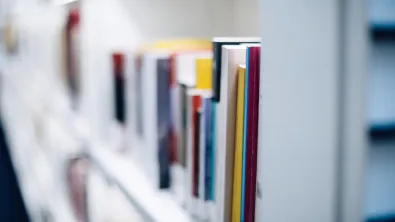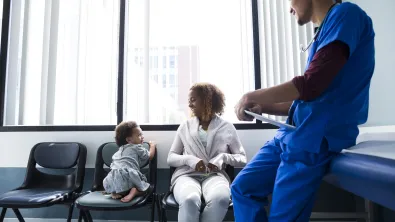Thank you for taking the time to speak with us about your experience. Can you tell us what happened to you in January 2022?
It all happened so fast. I was up really early to let the dog out; it was dark and icy. I took one step and boom— I slipped and landed directly on my head. I didn’t lose consciousness, but I was stunned and in incredible pain.
That sounds so scary. What did the doctors initially do and say?
I went to the emergency room at a local hospital, they took basic vitals, and I got a CT scan. The CT scan was excruciating because the headrest for the CT machine was right where I hit my head; I nearly threw up from the pain. The CT scan came back normal and the doctors recommended that I go home, rest and ice my head.
At that time, there was no real diagnosis— just a recognition that I had “hit my head.”
When did you know that something more serious was going on?
I was working with my kids on a simple pattern problem for the youngest’s math class when I realized that I couldn’t figure out the answer, and that really scared me.
At the time, I was a vice president at a large digital marketing firm; I have a PhD in computer interaction and I’ve taught at the college level. I can use my brain. I can think. And what’s more: I needed to use my brain. Not only am I a mom, but I was running a team at work. My inability to complete basic logic, let alone complex thought, was terrifying.
What was it like navigating the healthcare system to get the care you needed?
It was extremely challenging. Finding a neurologist was hard, and because I hadn't lost consciousness when I fell and because my CT scan was normal, I was diagnosed with a mild concussion.
This diagnosis struck me because there was nothing mild about what I was feeling.
In addition to the difficulty thinking, my demeanor had changed. I was short with my kids and detached with my husband. I was terrified because I’d worked my whole life to get to this point and I felt like I just kept messing up. I started calling around for a second opinion, which felt like an exercise in futility, but eventually I found a nurse practitioner and later a different neurologist who were able to really help me.
When did things start to improve for you?
A nurse practitioner was the first person who used the term traumatic brain injury (TBI), and at first it surprised me because there's a big leap between “mild concussion” and “traumatic brain injury.” But just hearing it called at TBI felt like a weight off my shoulders. This was six months after my fall, and the new diagnosis totally validated what I’d experienced since then. After that, I started occupational therapy for my vision, speech therapy for cognition and physical therapy for my neck. I also stopped working and could rest, which I believe is why I am feeling dramatically better today.
What do you think needs to change in the healthcare system to better support patients like yourself?
The diagnostic tests available to me when I fell seemed so clunky. They were good starts, good indicators—but not remotely adequate to diagnose an individual. The doctors are so highly trained, so intelligent and have a true passion for helping people, but it’s like giving Michelangelo a caveman club and a slab of marble and saying, “carve me The Pietà.” It just isn’t possible. They need more sophisticated, objective tools to get patients the care they need.



